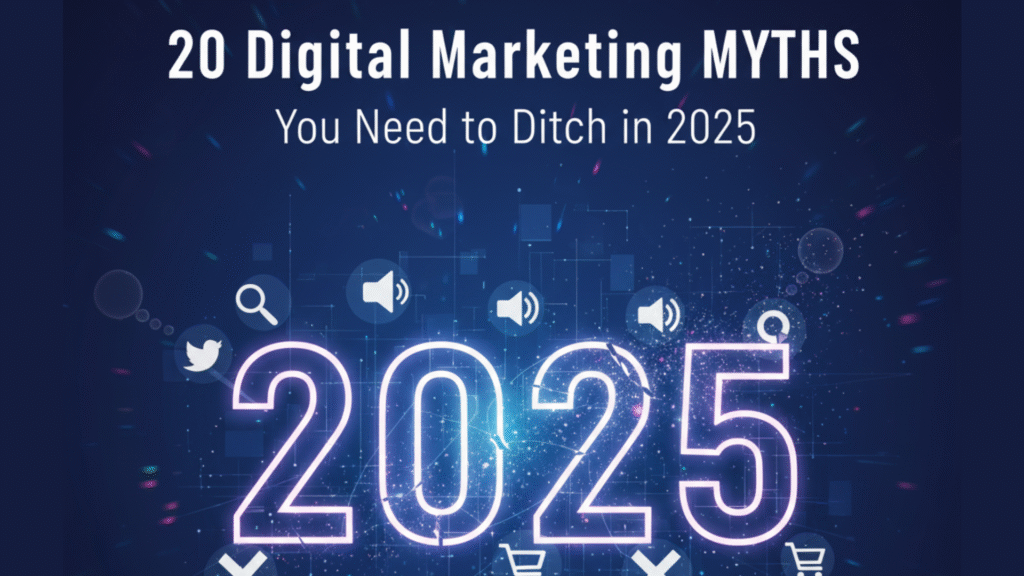20 Digital Marketing Myths You Need to Ditch in 2025

In the dynamic landscape of digital marketing agency in Bangalore, misconceptions can hinder progress and innovation. As we approach 2025, it’s crucial to debunk common myths that may prevent you from achieving your marketing goals. This blog post will illuminate 20 prevalent digital marketing myths, offering clear insights and evidence that will help you to refine your strategies and make informed decisions. Get ready to discover truths that can elevate your marketing efforts to new heights!
Myth #1 – SEO is a One-Time Task
One of the most persistent myths in the digital marketing world is that search engine optimization (SEO) is a one-time task. Many businesses believe that investing time and resources into their SEO strategy is sufficient for the long haul. However, this couldn’t be further from the truth. SEO is an ongoing process that requires consistent effort and regular updates.
Search engines like Google frequently update their algorithms, impacting website rankings. To ensure you’re maintaining your visibility, regular optimization is essential. This includes refreshing your content, analyzing keywords, and adapting to new SEO trends. Continuous monitoring and improvement are vital to keep your site relevant and competitive in search results.
Myth #2 – Social Media is Just for Brand Awareness
Another misconception is that social media’s primary role is merely to boost brand awareness. While this remains a crucial aspect, it’s only the beginning of what social media can offer. Platforms like Facebook, Instagram, and Twitter have evolved into robust marketing tools that can drive sales, generate leads, and engage customers proactively.
In 2025, businesses should leverage social media to create meaningful interactions with their audience. Whether through targeted ads or engaging content, social media plays a significant role in nurturing leads and converting them into loyal customers. The dual focus on brand presence and direct engagement can enhance overall marketing effectiveness.
Myth #3 – Email Marketing is Dead
In the era of social media, many believe that email marketing is no longer relevant. However, statistics continue to prove this myth wrong; email marketing remains one of the most effective digital communication tools. With a return on investment (ROI) of around 4200%, email consistently offers measurable results.
Email marketing not only allows for personalized communication but also serves as an excellent tool for nurturing customer relationships. It is a direct way to inform customers about promotions, new product launches, and valuable content. This myth must be dispelled, as email marketing is far from obsolete; instead, it can play a vital role in your broader marketing strategy.
Myth #4 – Higher Website Traffic Equals Higher Sales
A frequent misconception among marketers is that simply attracting more visitors to their website will result in increased sales. However, this is misleading. Not all traffic is beneficial; it’s crucial to focus on attracting the right audience. Higher numbers alone do not guarantee conversions.
The quality of traffic matters significantly. By targeting specific demographics and tailoring user experiences, your website can cater to potential customers more effectively. Concentrating on conversion optimization strategies with your current audience may yield better results than merely chasing higher traffic numbers.
Myth #5 – Content is King, So Quality Doesn’t Matter
While it’s true that content is essential in digital marketing, the notion that ‘content is king’ may mislead some into believing that quantity trumps quality. This is a misconception that can damage your marketing efforts. High-quality content is vital for user engagement, leading to better retention and conversion rates.
Focusing on creating valuable, meaningful content that resonates with your audience enhances brand authority and fosters trust. Invest time in crafting informative, well-researched pieces, and strive for quality that adds value rather than merely filling a content calendar.
Myth #6 – Pay-Per-Click (PPC) is Only for Big Brands
There’s a widespread belief that Pay-Per-Click (PPC) advertising is a tool reserved exclusively for large companies with hefty marketing budgets. However, this myth limits the potential of smaller businesses to compete effectively. PPC allows businesses of every size to target specific audiences with tailored messaging.
Moreover, the scalability of PPC advertising means that even modest budgets can yield substantial results. By focusing on ROI and leveraging analytics, smaller businesses can access the same benefits that large companies enjoy from PPC campaigns. Don’t let assumptions hold you back from utilizing this potent marketing strategy.
Myth #7 – Digital Marketing is Only for Millennials and Gen Z
Another common belief is that only younger demographics engage with digital marketing, leaving out older audiences. This is a significant misconception, as various age groups utilize digital channels differently. In fact, many adults aged 30-60 are now among the most significant users of digital platforms.
Understanding and targeting audiences across age groups can be pivotal for your marketing strategy. Consider utilizing analytics to identify how different demographics engage with your content and approach, allowing you to tailor your marketing efforts to a broader audience spectrum.
Myth #8 – You Can Ignore Mobile Optimization
As of 2025, neglecting mobile optimization is more detrimental than ever. With a growing number of consumers using mobile devices to browse and shop, having a mobile-friendly website isn’t just an option; it’s a necessity. User experience plays a big role in conversion, and if your site isn’t optimized for mobile users, you risk losing a substantial portion of potential customers.
Data indicates that mobile internet usage surpasses desktop usage, so it’s crucial to prioritize mobile optimization in your development strategy. Ensure that your website is responsive, fast, and easy to navigate for users accessing it via mobile devices. Doing so can significantly improve your engagement and conversion rates.
Myth #9 – More Followers Equals More Success
The belief that having a large follower count on social media equates to success is another misguided assumption. While follower numbers can be enticing, they don’t always reflect engagement or brand loyalty. The quality of followers and how they interact with your content is far more important.
Engagement metrics such as likes, shares, and comments provide a deeper insight into the health of your social media strategy. Focusing on building a genuine and engaged community will yield stronger results than simply amassing numbers. Strategize to create content that fosters interaction and connection with your audience.
Myth #10 – Automation Eliminates the Need for Strategy
With advancements in technology, some may believe that automation tools can replace the need for strategic planning. This myth disregards the fact that while automation can streamline processes, a well-thought-out strategy remains essential.
Strategic planning ensures that your automated campaigns align with your overall marketing objectives. Without strategic oversight, automated marketing can lead to misalignment and inconsistent messaging that does not resonate with your target audience. Therefore, blend automation with a robust and flexible strategy for optimal results.
Myth #11 – You Need to Be on Every Social Media Platform
Rather than spreading yourself thin across multiple platforms, many businesses mistakenly believe that being present on every social media outlet is key to success. However, this approach can dilute your marketing efforts. Focusing on the platforms where your target audience is most active ensures that your messages are received more effectively.
Selecting a smaller number of platforms can enable deeper audience engagement. Conduct research to understand where your target demographics spend their time and concentrate your efforts on those specific channels instead of trying to be everywhere at once.
Myth #12 – A Beautiful Website Guarantees Success
While a visually stunning website can attract visitors, it does not guarantee success. This common myth often overlooks the critical components of usability and functionality. User experience factors, including navigation, load times, and clarity of content, play pivotal roles in retaining visitors and converting leads.
To ensure website success, strive for both aesthetics and functionality. A beautiful website should also be intuitive and user-friendly, allowing visitors to find what they need quickly. Evaluating and iterating based on user feedback can help you strike the right balance.
Myth #13 – Video Content is Only for Entertainment
The perception that video content is merely for entertainment is increasingly outdated. Today, businesses can harness the power of video for various marketing objectives, including brand education and lead conversion. Video is a versatile medium capable of conveying complex information succinctly and attractively.
Incorporating video into your strategy can lead to better audience retention and an overall higher impact. Whether it’s through product demonstrations, webinars, or explainer videos, businesses can use video to educate their audience, enhance brand awareness, and improve conversion potential.
Myth #14 – Blogging is No Longer Effective
Some individuals may believe that blogging has lost its relevance in the fast-evolving digital space. This myth is easily debunked as blogging continues to play a crucial role in establishing authority, generating organic traffic, and engaging prospects. Consistent blogging enhances visibility in search engines and positions your brand as a thought leader in your industry.
By providing valuable content, you create an opportunity for customers to discover your services naturally. Therefore, do not shy away from developing a strong blogging strategy; this will help you maintain engagement while driving traffic to your website.
Myth #15 – Digital Marketing Can Be Done Without a Budget
While the idea of free marketing is appealing, believing that digital marketing can succeed without a budget is unrealistic. Effective digital marketing efforts require resources—whether that’s time, expertise, or financial investment. A well-allocated budget can significantly enhance your return on investment.
Investing in targeted advertising, quality content creation, analytical tools, and expert consultation can lead to accelerated growth and better overall results. Crafting a comprehensive marketing plan with a reasonable budget will maximize your chances of success in a competitive landscape.
Myth #16 – You Can Learn Everything You Need from Free Online Tutorials
While free resources can be helpful for beginners, relying solely on them may not empower you with comprehensive knowledge of advanced marketing strategies. The fast-evolving nature of digital marketing demands continual learning and expertise.
Consider investing in formal education or professional training programs that provide deeper insights and current best practices. Learning from seasoned professionals can give you an edge over competitors who are restricted to self-taught methods and outdated information.
Myth #17 – All Traffic is Good Traffic
Not all traffic is beneficial, and believing otherwise can lead to misguided marketing strategies. Attracting the wrong audience can have negative implications, from increased bounce rates to poor conversion rates. Therefore, focusing on targeted audience engagement is crucial.
Harness targeted marketing strategies by understanding your audience’s needs, preferences, and behaviors. Creating tailored content and utilizing audience segmentation ensures that your marketing efforts attract relevant traffic that has a higher likelihood of converting.
Myth #18 – SEO is All About Keywords
SEO encompasses a broader scope than mere keyword optimization. The misconception that keywords are the sole focus of SEO neglects the importance of user intent, content relevance, and overall site health. Modern SEO strategies must incorporate various factors beyond keyword placement.
Invest in a comprehensive SEO strategy that accounts for user engagement, page load speed, mobile responsiveness, and technical site factors. Shifting your focus towards a holistic approach will yield better results and improve your site’s performance in search engine rankings.
Myth #19 – Digital Marketing Results are Immediate
The expectation that digital marketing yields instant results is misleading. Solid results take time, strategy, and consistent effort to materialize. Many underestimate the duration required for campaigns to gain traction and deliver substantial outcomes.
Establish realistic timelines for your digital marketing efforts, and be prepared to adapt your strategy based on performance metrics. Patience and persistence are keys to achieving long-term success; avoid the temptation of expecting immediate gratification from your marketing endeavors.
Myth #20 – You Can’t Measure Digital Marketing Effectively
The belief that digital marketing lacks measurable outcomes is another myth that can hinder business growth. Digital marketing offers a wealth of data and analytics tools that allow marketers to track their campaigns’ performance effectively. From click-through rates to conversion rates, every aspect of your marketing efforts can be measured.
Utilizing analytics tools can provide valuable insights that inform your future strategies, allowing for continuous improvement and optimization. With the right metrics in place, you can demonstrate the effectiveness and ROI of your digital marketing campaigns.
Conclusion: Reflect, Share, and Engage
As we embark on 2025, it’s essential to reflect on the myths we’ve believed and how shifting these mindsets can significantly impact our marketing strategies. By embracing these truths, you can enhance your marketing efforts and achieve more comprehensive results. We encourage you to share your thoughts, experiences, and any other myths you’ve encountered in the comments section below. Let’s engage in a productive conversation to spread knowledge and support one another in our digital marketing endeavors!
Join the Conversation
Please share your insights and experiences related to the myths discussed today! Let’s foster a community of like-minded marketers eager to learn from one another. Don’t hesitate to spread the word—share this post with colleagues or across social media channels to raise awareness!




